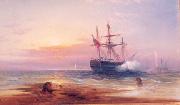La Peinture à l'huile en gros de Chine & Encadre |
|||||||||||

|
|||||||||||
|
|
|
||||||||||||||
|
Edward Moran
(August 19, 1829 in Bolton, Lancashire, England -June 8, 1901 in New York City) was an American artist. He emigrated with his family to America at the age of 15, and subsequently settled in Philadelphia, where after having followed his fathers trade of weaver, he became a pupil of James Hamilton and Paul Weber. In 1862 he became a pupil of the Royal Academy in London; he established a studio in New York in 1872, and for many years after 1877 lived in Paris. He was a painter of marine subjects and examples of his work such as Devile Crag; Island of Grand Manan are in many prominent collections. Among his canvases are 13 historical paintings, intended to illustrate the marine history of America from the time of Leif Ericsson to the return of Admiral Dewey's fleet from the Philippines in 1899. His sons Edward Percy Moran (born 1862) and Leon Moran (born 1864), and his brothers Peter Moran (born 1842) and Thomas Moran. |
||||||||||||||
|
|
||||||||||||||
|
||||||||||||||
|
|
||||||||||||||
| Edward Moran
(August 19, 1829 in Bolton, Lancashire, England -June 8, 1901 in New York City) was an American artist. He emigrated with his family to America at the age of 15, and subsequently settled in Philadelphia, where after having followed his fathers trade of weaver, he became a pupil of James Hamilton and Paul Weber. In 1862 he became a pupil of the Royal Academy in London; he established a studio in New York in 1872, and for many years after 1877 lived in Paris. He was a painter of marine subjects and examples of his work such as Devile Crag; Island of Grand Manan are in many prominent collections. Among his canvases are 13 historical paintings, intended to illustrate the marine history of America from the time of Leif Ericsson to the return of Admiral Dewey's fleet from the Philippines in 1899. His sons Edward Percy Moran (born 1862) and Leon Moran (born 1864), and his brothers Peter Moran (born 1842) and Thomas Moran. Salute_at_Sunset. Salute at Sunset. Oil on canvas, 12 x 20 inches ca. 1865(1865) cjr Salute at Sunset. Oil on canvas, 12 x 20 inches ca. 1865(1865) cjr |
||||||||||||||
|
Related Paintings to Edward Moran :. |
||||||||||||||
|
|
||||||||||||||
|
|
||||||||||||||
|
CONTACTER DES Etats-Unis |







